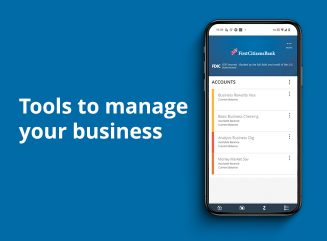Digital banking for business
Seamlessly access all of your accounts from one place with First Citizens Digital Banking for business.

Invest how you want, when you want, in real time with Self-Directed Investing.

Seamlessly access all of your accounts from one place with First Citizens Digital Banking for business.
We're committed to serving companies as they expand and succeed. The proof is in our success stories.
2026 Market Outlook video: Available now
The Making Sense team reflects on 2025 and discusses key headwinds and tailwinds for 2026.
Starting a new business all starts with a grand vision—but as anyone who's done it quickly discovers, there are more than a few mundane details to iron out along the way.

Fortunately, if you build a strong legal and financial foundation in your business, you can increase the likelihood that it'll thrive. Follow these fundamental steps to help support your company's ongoing success.
Your business type and goals are important considerations when creating your legal structure. For example, are you going solo or will you have partners? Many business attorneys don't recommend operating as a sole proprietor because it exposes you to significant risk. If you're in a partnership but don't have a formal legal structure, you'll be personally liable for your partner's actions in addition to your own.
Operating as a limited liability company, commonly called an LLC, or a corporation will shield you from personal liability. LLCs are typically easier to form and have fewer maintenance requirements than corporations. Although all states allow LLCs, some don't allow single-member or sole-owner LLCs. Check your state's government website for the specific rules.
Once you decide the legal structure, you or your attorney can file articles of formation or incorporation with your secretary of state.
Depending on the type of business, your startup costs could range from a few hundred dollars to thousands. You may need funds for marketing, contractors or inventory.
To determine what you need and how much it'll cost to start financing your new company, calculate how much you'll need to start a business, then create a brief business plan and map the associated costs. Will you finance it with your savings, help from friends and family, a line of credit or other means?
Your startup may not yet qualify for a bank loan but you may as an individual, especially if you have solid personal credit and assets. You could also tap suppliers, equipment providers or microlenders to ensure you have the cash flow you need.
Creating an operating or shareholders agreement is important, especially if you have a co-founder—even if this person is a spouse or family member. Sit down and discuss what you want to do with the business, including who's responsible for which aspects of the operations and what occurs if something happens to either of you.
Create a buy-sell agreement, which goes into much more detail regarding the why, what and how of an owner exit. Do the upfront work to clarify and communicate your expectations, then have your attorney document this information in the appropriate agreements. This will help ensure your business continues to grow and thrive even if you or your partner's priorities change.
You'll need an employee identification number, also known as an EIN or tax ID number. Contact the IRS to obtain your EIN. For most businesses, the entire application and approval process can be done online within a few minutes.
If you're operating as a legal entity, you'll need your articles of incorporation or organization. You may also need a company resolution stating that you're authorized to open a bank account for the business. Present these documents along with your government-issued identification and EIN.
Make sure to use your business bank account for all business activities. Running personal items through your business bank account can cause serious issues with the IRS and could nullify the legal protection that your legal business structure provides.
If you're conducting business locally—and if you're a freelancer or a sole proprietor—you'll need a business license from your municipality or county, depending on where your office is located. If you're unsure of your jurisdiction, check with your county's license office. The annual licensing fees are typically based on revenue generated.
You may also need permits, like a fire permit to store flammable materials onsite, health department permits for food or a liquor license if you'll serve alcohol. Permits are typically location-based and can be costly, so do your research in advance.
If you operate as a corporation, make sure to hold annual shareholders and board of directors meetings. For all structures, document your decisions and record any cash infusions into and distributions out of the company.
Starting a new business is an exciting leap. Use this resource as a guide—in conjunction with a solid business attorney and banker—to help you navigate the uncharted territory so you not only survive but thrive.



This material is for informational purposes only and is not intended to be an offer, specific investment strategy, recommendation or solicitation to purchase or sell any security or insurance product, and should not be construed as legal, tax or accounting advice. Please consult with your legal or tax advisor regarding the particular facts and circumstances of your situation prior to making any financial decision. While we believe that the information presented is from reliable sources, we do not represent, warrant or guarantee that it is accurate or complete.
Third parties mentioned are not affiliated with First-Citizens Bank & Trust Company.
Links to third-party websites may have a privacy policy different from First Citizens Bank and may provide less security than this website. First Citizens Bank and its affiliates are not responsible for the products, services and content on any third-party website.
First Citizens Bank is a Member FDIC and an Equal Housing Lender icon: sys-ehl.
NMLSR ID 503941

Treasury & Cash Management
Electronic Bill Presentment & Payment
Investment & Retirement Services
Community Association Banking
Equipment Financing & Leasing
Credit Cards
Merchant Services
Email Us
Please select the option that best matches your needs.
Customers with account-related questions who aren't enrolled in Digital Banking or who would prefer to talk with someone can call us directly.